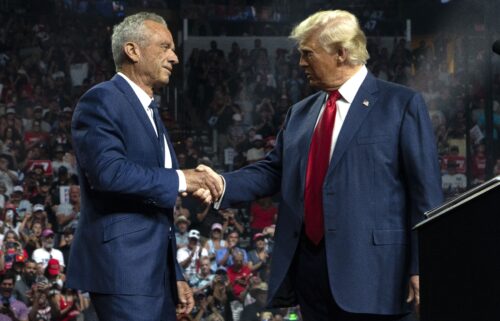CNN poll: Most Americans want US to do more to stop Russia, but most also oppose direct military action

By Jennifer Agiesta and Ariel Edwards-Levy, CNN
Americans overwhelmingly favor increased economic sanctions against Russia and broadly support further action to stop Russia’s invasion of Ukraine, but most oppose direct US military action, according to a new CNN poll conducted by SSRS.
Eighty-three percent of Americans said they favored increased economic sanctions against Russia in response to the invasion, with just 17% opposed. New sanctions and economic restrictions aimed at Russia were announced by the US and other countries while the poll was in the field on Friday and Saturday. Support for increased sanctions in the new poll stands well above the 67% who favored the same in 2014 amid Russia’s incursion into eastern Ukraine and its annexation of Crimea.
A smaller majority, 62%, also wanted to see the US do more to stop Russian military action in Ukraine, with 38% saying the country has already done enough. But the public is opposed to direct military action by the US: Only 42% were in favor of such a move should sanctions fail to work, with 58% opposed. Among those who said the US should do more to stop Russia’s military incursion, though, 58% were in favor of the use of military action if sanctions failed.
There’s little sign that the public is rallying around President Joe Biden’s response to the crisis, despite the broad support for the type of sanctions his administration has put in place. Just 42% said they trust Biden at least moderately to make the right decisions regarding the situation in Ukraine, about on par with his overall approval rating in recent polling. These results, like most of Biden’s numbers, are deeply polarized, with 84% of Democrats but just 9% of Republicans saying they trust his decision-making at least moderately.
When it comes to how the US should proceed, however, the partisan divides are far more muted, and in some cases nearly nonexistent. More than 8 in 10, across party lines, backed increased economic sanctions (84% among Democrats and Republicans, 81% among independents), and majorities said the US should be doing more to stop Russia (65% among Republicans, 64% among Democrats and 57% among independents). Similarly, majorities across parties opposed military action should sanctions fail (60% among independents, and 56% each among Democrats and Republicans).
There are, however, generational differences: Americans under age 45 were 11 percentage points less likely than older Americans to support increased sanctions and 10 points less likely to say the US should do more against Russia, though neither age group favored US military action.
Americans who have served in the military or live in a household with someone who’s served were generally more likely to favor action against Russia than were those in non-military households: 87% favored sanctions in veteran households versus 81% in non-veteran households, 67% said the US should do more vs. 59% in non-veteran households, and 51% favored military action vs. 38% in non-veteran households.
Most Americans (71%) said the US should consider the impact on gas prices when deciding its policies toward Russia, although only about one-third (34%) said it should serve as a major factor. There is a partisan gap here, with 45% of Republicans versus about 3 in 10 Democrats (28%) and independents (30%) saying it should be a major factor.
Broad majorities of the public said that they were paying attention to the situation in Ukraine (79% were following at least somewhat closely) and that they were worried about the conflict leading to broader war in Europe (80% very or somewhat worried), leading to Russian attacks elsewhere (77%) or threatening US national security (72%). But only about 3 in 10 Americans expressed deep concern about each of these possibilities or said they were following the news very closely.
Those paying at least some attention were modestly more likely than those who haven’t been following the situation to support sanctions (85% vs. 74%) and to say the US should do more to stop Russian military action (63% vs. 55%), but both groups were about equally unlikely to support US military intervention. Those following more closely were also more likely to be very worried about whether the conflict would lead to a broader war in Europe (35% vs. 20%), Russian attacks elsewhere (37% vs. 21%) or threats to US national security (29% vs. 18%).
The CNN poll was conducted by SSRS February 25-26 among a random national sample of 1,011 adults surveyed by text message after being recruited using probability-based methods. Results for the full sample have a margin of sampling error of plus or minus 4.4 percentage points. It is larger for subgroups.
The-CNN-Wire
™ & © 2022 Cable News Network, Inc., a WarnerMedia Company. All rights reserved.

